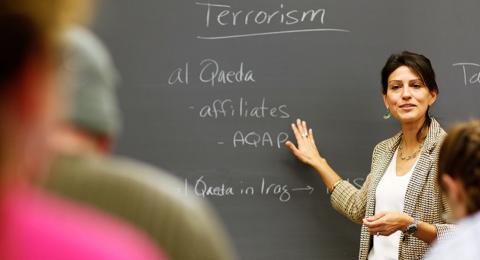The interdisciplinary terrorism studies minor gives students a holistic view of the subject of terrorism, our relations with the international community, and the policies put in place to address common goals of security, economic stability, and human rights.
What is terrorism studies?
The terrorism studies minor explores the causes and consequences of violent extremism and strategies to solve this complex challenge at home and abroad. The terrorism studies minor draws from different academic disciplines to give you a broad understanding of this phenomenon and how states may counter terrorist threats.
Why study terrorism studies at UNH?
Integrating insights from homeland security, global affairs, political science and history, the terrorism studies minor gives students the tools to analyze violent extremism and devise strategies to counter terrorism. Courses explore foreign affairs as well as domestic law and public policy. The minor prepares you for a career in government, intelligence, preparedness, community resilience and more. Get a head start on your master’s degree by using the terrorism studies minor as an accelerated track to a master’s degree in global conflict and human security.
Potential career areas
- National security
- Intelligence
- Foreign affairs
- Emergency management
- Forensics
- Law enforcement (local/state/federal)
- Global security
- Risk management
- Public policy
- Critical infrastructure protection
Curriculum & Requirements
Terrorism is often a top priority of US national and homeland security agencies such as the Department of Defense, Intelligence Community, FBI, CIA, Department of Homeland Security, and State Department. The terrorism studies minor explores the causes, dynamics, and prevention of violent extremism at home and abroad. Courses explore different types of violent extremism and the range of counterterrorism strategies used in the US and other countries from interdisciplinary perspectives.
The terrorism studies minor requires students to complete five courses (18-20 credits). All five courses applied to the terrorism studies minor must be completed with a minimum grade of C- and an overall GPA of 2.0. Students must take at least three 500-level or above courses to complete the minor. Transfer students may transfer up to two courses, subject to the approval of the Homeland Security program coordinator. Courses taken on a pass/fail basis may not be used for the minor. No more than eight credits to satisfy major requirements may be used in the minor. Students in accelerated Global Conflict and Human Security master’s programs may use up to six credits of 800-level courses.
| Code | Title | Credits |
|---|---|---|
| Required courses | ||
| HLS 505 | Political Violence and Terrorism | 4 |
| HLS 555 | Comparative Homeland Security Systems | 4 |
| HLS 650 | Topics in National Security Intelligence | 4 |
| Select two courses from the following: | 6-8 | |
HLS 665 | Bioterrorism, Biosecurity, and Biodefense | |
HLS 750 | Emergent Topics in Homeland Security/Homeland Defense | |
POLT 403 | United States in World Affairs | |
| Total Credits | 18-20 | |
Explore Program Details
-
Associate ProfessorAssociate ProfessorEmail: Terrence.O'Sullivan@unh.edu
-
Senior LecturerTerrorism Studies Minor CoordinatorEmail: Sonic.Woytonik@unh.eduPhone: (603) 641-4135








